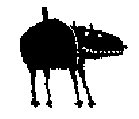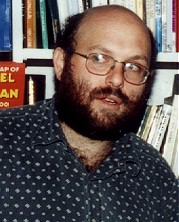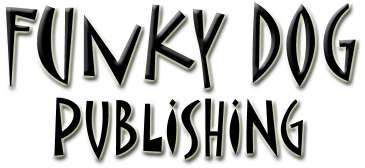Funky Dog Publishing
Circa 1999 - 2004
Funky Dog Publishing was an exclusively online press publishing chapbooks and collections of poetry.
This was their website. Content is from the site's archived pages offering the visitor just a glimpse of the poetry that was available.
Since 1999 Funky Dog Publishing has been dedicated to promoting and supporting a community of poets working entirely in electronic form.
Funky Dog Titles

The Athens Avenue
Poetry Circle
Poetry By Mary Barnet
Passing It On To You
Poetry By Janet Buck
Strawberry Nipples
Poetry By Kathleen Isacson
Uncertain Terms
Poetry by larry jaffe
unprotected poetry
Poetry by Kevin McGowin
The Better Part Of A Fortnight
Poetry by Elisha Porat
Poetry Is The
Sudden Process
Of Verbal Compression
Poetry by Doug Tanoury
Detroit Poems
St. Mary's Art Cloister
Chicago Poems
Hollywood Park Poems
Crows On My Path

Mary Barnet
Moshe Benarrock
Janet Buck
Ruth Daigon
Klaus Gerken
Doug Tanoury
Poetry is transformational and transcendant, changing not only the subjects it touches, but the poet who writes it and the reader who reads it. Upon entering this site, you enter a blackbox of change where one thing becomes another and boundries become indistinct. It is a place that celebrates the extraordinary contained in ordinary moments. It is a place touched by the magic of poetry.
+++++
Moshe Benarroch
 Moshe Benarroch was born in 1959 in Tetuan/Morocco, between Tangier and Gibraltar. He grew up in a mixture of cultures and languages, Spanish being his mother tongue, attending a French school, hearing the Arabic of the streets and praying in Hebrew. In 1972 he emigrated to Israel and lives since then in Jerusalem.
Moshe Benarroch was born in 1959 in Tetuan/Morocco, between Tangier and Gibraltar. He grew up in a mixture of cultures and languages, Spanish being his mother tongue, attending a French school, hearing the Arabic of the streets and praying in Hebrew. In 1972 he emigrated to Israel and lives since then in Jerusalem.
Published books in Hebrew: The Immigrant's Lament (poetry) 1994. The Coming Book (prose) 1997. The Bread And The Dream (poetry) 1998, The Poetry Of The End Of The World (poetry), 1999. "Keys To Tetuan" (a novel), 1999.
His poems and prose have been published in numerous publications in Israeli literary magazines, and international magazines, recently in: Ygdrasil, Ashville Poetry Review, Perihelion, Miller's Pond, Revue Europe, Etcetera, Jewish Currents, Emotions, Xero, The Poet's Guild Quarterly, Poetrymagazine.com.
His works have been published in Hebrew, Spanish, French, Chinese and English He writes in Hebrew, Spanish and English. He is contributing editor inYgdrasil, and has e-published a book in Ygdrasil titled 'Moben's Poems' in English. Esquio will publish a book of his poetry in Spanish in 2000.
________________________________________
Poems By Moshe Benarroch
Waitress
Entangled
The people of this city
faces
Depart
Earthquake
A love poem if there ever was one
Love is never blind
To Rumi
The Vintage Book Of Contemporary American Poetry
We Count Our Dead
When we go to sleep
we count our dead
When we wake up
we count our dead
When we end the century
we count our dead
When we kill
we count our dead
When we live
we count our dead
When we eat
we count our dead
When we pray
we count our dead
When we celebrate life
we count our dead
When we write a poem
we count our dead.
©1999 Moshe Benarroch
To my 12 years old daughter
Soon you'll be young
The world will be yours
and you will not know it
The world will be yours
and you will not own it
by the time you'll know it
the world will not be yours
and only the word will remember.
©1999 Moshe Benarroch
++++
Janet Buck
Janet Buck teaches writing and literature at the college level. Her poetry and poetics have appeared in The Melic Review, The Pittsburgh Quarterly, Kimera, 2River View, Tintern Abbey, Southern Ocean Review, Niederngasse, Lynx: Poetry from Bath, The Horsethief's Journal, salon D'Art and hundreds of journals world-wide. In 1998 and 1999, she has won numerous creative writing awards and has been a featured poet for Seeker Magazine, Poetry Today Online, Vortex, Conspire, Poetry Cafe, Dead Letters, the storyteller, Poetry Heaven, Athens City Times, Poetik License, 3:00 AM e-zine, Poetry Super Highway and Carved in Sand. Buck's poems entitled Bones & Borders and Acrylic Thighs were recently nominated for the Pushcart Prize in Literature.

Janet's first e-book, entitled Reefs We Live, is now available at Word Wrangler Publishing. On December 1st, Newton's Baby Press will release her first print collection entitled Calamity's Quilt:. She is one of ten poets to be featured at the One Heart, One World exhibit at the United Nations Exhibit Hall in New York City in April, 2000. Her poem Acrylic Thighs will be translated into five languages and paired with original artwork. The tour will travel to Brazil, France, Australia, Vietnam and Japan.
Poems By Janet Buck
The Wine Country
Crushed Slippers
The Bumper Sticker
The Morphine Drip
The Tourniquet
Peacock Plumes
On Carousels
A Puzzle To Build
Shell Shock
Stripped Wheat
Dirty Silverware
Dress Blues
In Scent of a Woman
Al Pacino gets all decked out
in his smart dress blues
and prepares to shoot
his head off in a ritzy room
of a lush hotel.
His blindness seems
a ruse of fate
asphyxiating courtesy.
Alphabet soup
of Braille with bread,
oddity that's
uninvited to the prom,
but still in need,
so much in need,
of havens on the River Styx.
I watched the film
from the distance of eyes.
But some of what he hated so
in terms of carnal punishment
I understood from walking on
a bleeding stump.
Money was a luxury--
lust that doesn't mean enough--
gold and turquoise peacock
feathers parked on birds
that scream inside.
Serendipity's spades--
curled cards too many eyes
had second-guessed.
Tragedy confessed, compressed,
obsessed with playing out its palms.
The "scent" of the woman was sentience
and licking smooth agility.
Cyclone time in Windsor knots
left gender issues in the dust.
-Janet I. Buck
Poem By Rev Sale
Ode To A Cast Pan
In the twilight of the kitchen's breath,
Al Pacino's ghost lingers yet.
Cast iron skillets, seasoned, old,
hold stories, whispered, bold.
Olive oil dances on the surface tense,
a culinary waltz, aroma's incense.
These pans, like armor from battles past,
speak to meals that are meant to last.
A sear, a sizzle, a savory note,
like a heartfelt line the great actor spoke.
He, in his blues, with sightless gaze,
and these skillets, dark, through the kitchen's haze.
Each handle, worn from a thousand grips,
like life's relentless apocalypse.
Yet in that heft, there's comfort, truth,
a timeless pantheon of youth.
Pacino's woes, the skillets' crust,
meld in the heat, trust upon trust.
Iron black as a starless night,
unyielding against the temporal fight.
A patina earned from fiery trials,
parallels of life's denials.
In them, the sizzle of steak, the crackle of cornbread,
the resilience in the stories unsaid.
A chef's deft flip, a panther's leap,
like Al's tango, swift and deep.
The cast iron's clang, a declaration,
against the silence, a celebration.
For in the kitchen, as on the screen,
life's heaviest burdens are carried unseen.
The "scent" of the skillet, a robust claim,
against the bland, the safe, the tame.
Like the Colonel's brash, unyielding will,
they stand their ground, seasoned still.
And in their resilience, we find a kin,
metal and man, thick-skinned.
-Rev Sale
More Background on Funky Dog Publishing
Funky Dog Publishing stands as a representative of the early movement of online literary presses that flourished at the turn of the 21st century. Though now defunct, its legacy persists in the digital poetry landscape, as it played a vital role in democratizing poetry publishing and fostering a global community of writers. This article explores the history, reputation, audience, cultural significance, and broader impact of Funky Dog Publishing, drawing on external sources and the context of its era.
History and Founding Context
Funky Dog Publishing operated during a transformative period for literary publishing. The late 1990s and early 2000s saw the internet revolutionizing how literature was created, shared, and consumed. Small presses and literary magazines, once limited by the costs and logistics of print, found new opportunities online. According to discussions on digital publishing history, this era gave rise to a wave of independent publishers who leveraged the web to reach niche audiences and support emerging voices.
Funky Dog Publishing was part of this movement, focusing exclusively on poetry chapbooks and collections. Its model was similar to other early e-presses, such as Mudlark and the now-archived Poetry Super Highway, which provided platforms for poets outside the mainstream. These presses often operated with minimal resources, relying on passion and community engagement rather than commercial backing.
Reputation and Reviews
Direct reviews of Funky Dog Publishing are scarce, reflecting both its niche focus and the era’s limited digital archiving. However, the press is occasionally mentioned in retrospectives and forum discussions about early online poetry communities. On Reddit and writing forums, users recall Funky Dog Publishing as a legitimate, community-driven project rather than a vanity or scam operation. It is not listed among scam publishers or vanity presses in watchdog reports, which is notable given the proliferation of questionable publishing outfits during the early days of online self-publishing.
Writers who published with Funky Dog Publishing have gone on to contribute to other respected literary journals, suggesting that the press maintained a certain editorial standard. The absence of negative press or widespread complaints further supports its reputation as a well-intentioned, if small-scale, literary venture.
Audience and Community
Funky Dog Publishing’s audience consisted primarily of poets and poetry enthusiasts who embraced the possibilities of digital publishing. The press appealed to:
-
Emerging poets seeking publication outside traditional print venues.
-
Readers interested in contemporary poetry and electronic literature.
-
Members of online poetry communities, including those who participated in collaborative projects and workshops.
The sense of community fostered by Funky Dog Publishing mirrored other online poetry circles of the time. For example, the Athens Avenue Poetry Circle, associated with the press, functioned as a collaborative space where poets could share work, provide feedback, and support each other’s creative growth. This approach was common among early web-based literary groups, which often prioritized inclusivity and experimentation over commercial success.
Notable Contributors and Works
While Funky Dog Publishing did not achieve mainstream fame, it published works by poets who later gained recognition in broader literary circles. Some contributors, such as Janet Buck and Moshe Benarroch, have established reputations and published widely in other journals and anthologies. Their involvement with Funky Dog Publishing reflects the press’s role as an incubator for talent and a stepping stone for poets building their careers.
The press’s catalog included a range of poetry chapbooks and collections, often characterized by experimental forms, personal themes, and a willingness to push boundaries. This spirit of innovation was typical of the digital poetry scene, where the lower costs and flexible formats of online publishing encouraged risk-taking and diversity.
Cultural and Social Significance
Funky Dog Publishing’s cultural significance lies in its pioneering role in the digital poetry revolution. By providing a platform for poets in the early days of the web, it contributed to several important trends:
-
Democratization of Publishing: The press lowered barriers to entry, allowing poets from diverse backgrounds to share their work without the gatekeeping of traditional publishers.
-
Experimentation with Form: Digital publishing enabled new poetic forms, including hypertext and multimedia, which Funky Dog Publishing and its peers helped popularize.
-
Global Community Building: The internet allowed poets from around the world to connect, collaborate, and share ideas, fostering a sense of global literary citizenship.
These trends have since become central to the literary landscape, as evidenced by the proliferation of online journals, self-publishing platforms, and virtual writing communities.
Press and Media Coverage
Funky Dog Publishing operated before the rise of social media and widespread online literary criticism, so mainstream press coverage is limited. However, it is occasionally referenced in discussions about the history of online poetry and digital publishing. Academic articles and retrospectives on early web-based literary activity sometimes cite Funky Dog Publishing as an example of the grassroots energy that characterized the era.
In interviews and essays about the evolution of poetry publishing, editors and poets from the early 2000s often mention the importance of small presses like Funky Dog Publishing in shaping the digital literary landscape. These presses are credited with fostering innovation, supporting marginalized voices, and challenging the dominance of print-centric literary culture.
Details, Insights, and Specifics
Publishing Model:
Funky Dog Publishing operated as a digital-first press, accepting submissions via email and publishing works directly to its website. This approach minimized costs and allowed for rapid publication cycles, in contrast to the lengthy timelines of traditional print publishers.
Editorial Approach:
The press favored contemporary, experimental poetry, often featuring works that explored personal and social themes. Its editorial stance was inclusive, welcoming poets at various stages of their careers and encouraging diverse perspectives.
Community Engagement:
Through initiatives like the Athens Avenue Poetry Circle, Funky Dog Publishing created spaces for poets to interact, critique each other’s work, and develop their craft. This collaborative ethos was central to the press’s identity and mirrored the broader culture of early online poetry communities.
Technological Innovation:
By embracing web publishing, Funky Dog Publishing helped popularize electronic chapbooks and collections, paving the way for later developments in e-books and digital literary magazines. Its willingness to experiment with format and distribution anticipated many of the trends that now define online publishing.
Examples and Legacy
Funky Dog Publishing’s legacy can be seen in the continued vitality of online poetry publishing. Many of the practices it helped pioneer-such as digital chapbooks, virtual poetry circles, and global collaboration-are now standard features of the literary world. Contemporary online journals and presses owe a debt to early innovators like Funky Dog Publishing, which demonstrated the potential of the internet to transform literary culture.
Notable examples of its influence include:
-
The proliferation of online poetry workshops and critique groups, which build on the model of collaborative engagement fostered by Funky Dog Publishing.
-
The rise of e-book poetry collections, which echo the digital chapbooks popularized by early web presses.
-
The increasing diversity of voices in contemporary poetry, reflecting the inclusive ethos championed by Funky Dog Publishing and its peers.
Funky Dog Publishing was a trailblazer in the world of online literary presses, providing a platform for poets during a period of rapid technological and cultural change. Its commitment to community, experimentation, and inclusivity helped shape the digital poetry landscape and paved the way for future generations of writers and publishers. While the press itself is no longer active, its impact endures in the vibrant, diverse, and innovative world of online poetry.
